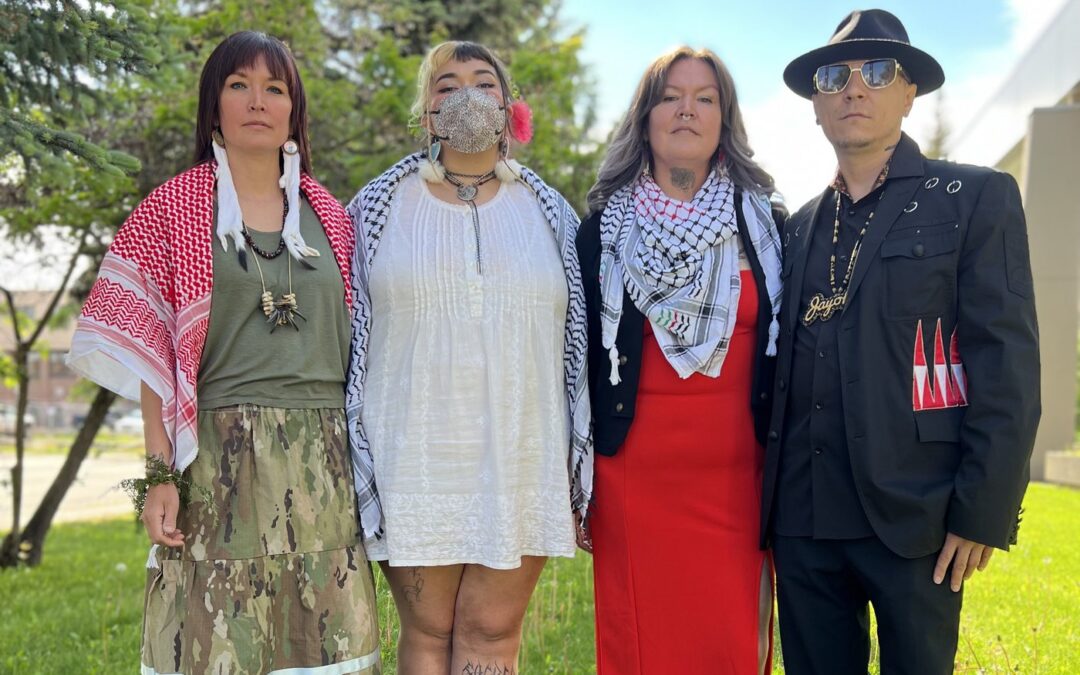Photo: Land defenders Sleydo’ (Molly Wickham), Shaylynn Sampson, and Corey “Jayohcee” Jocko, joined by Sleydo’s sister, Jen Wickham (second from right). / Photo submitted by Amnesty International.
By: Sonal Gupta
Local Journalism Initiative Reporter
Canada’s National Observer
Three Indigenous land defenders are set to be sentenced this week for blocking construction of the Coastal GasLink pipeline on their nation’s unceded territory in northern British Columbia.
Hereditary Chief Na’Moks said the defenders from the Wet’suwet’en Nation are standing on the right side of history. He called their efforts an act of care for the land, water and air that sustain everyone. “They are simply protecting what is right for this entire planet,” he said.
Sleydo’ Molly Wickham, Shaylynn Sampson and Corey “Jayohcee” Jocko were convicted in January 2024 for defying court injunctions that aimed to end blockades against pipeline construction in 2019. The sentencing hearing for the three begins today in Smithers, BC. For the community, it’s raising fundamental questions about how Canadian and Indigenous law coexist.
Jen Wickham, Sleydo’s sister and spokesperson for the Gidimt’en Checkpoint — land defenders who occupied a BC camp to oppose the pipeline, said Sleydo — the wing chief of Cas Yikh in the Wet’suwet’en Nation — continues to face restrictions that limit where she can go and what she can do on their territory, along the Morice River, south of Houston, BC.
“It’s really offensive to our elders that my sister is now facing jail time for doing her job and respecting our laws,” she said. “I believe that the Crown’s intention for pushing for jail time is to try and discourage and deter our community members and our young people from upholding their responsibilities.”
The case has become more complex because of a 2021 RCMP raid on Wet’suwet’en territory, during which heavily armed officers enforced the injunction against pipeline blockades and arrested several land defenders. In a later ruling, the BC Supreme Court found parts of the raid violated their Charter rights, citing improper police conduct and racist language by officers — findings now expected to be considered during sentencing, Wickham said.
While the Crown is seeking jail time, the defence is asking for leniency, pointing to the time already spent in custody and findings of the 2023 Gladue reports, she said. These reports, made for Indigenous defendants, outline how colonization has impacted their communities and suggest sentences that keep people connected, instead of sending them to jail.
“[But] it has actually had the opposite effect — more Indigenous people are being incarcerated since the Gladue reports were implemented,” Wickham said.
Na’Moks said while the government claims recent legislation, such as Bill 14 and 15 in BC and Bill C-5 federally, is meant to streamline project approvals, these laws actually risk increasing the criminalization of Indigenous Peoples. “We’re basically going to be made more criminal than we are already,” he said.
To Na’Moks, Canadian and Indigenous law are fundamentally different and incompatible. While Indigenous law is much older and based on “common sense” principles focused on caring for the land, air and water, that’s not the case for Canadian law, he said. “We’ve always done the right thing. We’ve never broken the law. They changed the law. They changed the goalpost to suit themselves,” he said, referring to the Canadian government.
Wickham said while Canada has adopted UNDRIP, which requires free, prior and informed consent from Indigenous Peoples, it “has done nothing about it.” She called government promises of reconciliation “lip service” and described past agreements like the 2020 memorandum of understanding as “a façade meant to quiet outrage.”
Amnesty International considers ‘prisoner of conscience’ label
Human rights groups are also watching the sentencing closely. Mary Kapron from Amnesty International will be there in person. She said if the Wet’suwet’en land defenders are sent to jail or put under house arrest, Amnesty will call them prisoners of conscience — meaning people detained or imprisoned because of their beliefs or identity in a way that violates their human rights.
“Their detention would be considered arbitrary because the injunction order they violated is extremely overbroad and violates Indigenous Peoples’ rights to be on their territories and their right to self-determination,” Kapron said.
Amnesty research shows that this injunction unfairly strips away the Wet’suwet’en Nation’s rights, she said. This would only be the second time Amnesty has referred to someone convicted of a crime in Canada as a “prisoner of conscience,” with the first being Wet’suwet’en chief Dsta’hyl, also known as Adam Gagnon, who spent 60 days under house arrest in 2024 for standing up to the pipeline.
Wickham said this fight is about much more than just a pipeline; it is about defending Indigenous sovereignty, laws and ways of life that have existed for thousands of years. Despite the pressures and efforts to criminalize their actions, she said the Wet’suwet’en people stay strong and committed to looking after their territory.
“We’ve been jailed before for holding our potlatches and speaking our language and taking care of our territory since contact. And that never stopped us,” she said.
The sentencing this week will also send a strong message to Indigenous Peoples across the country about the lengths the government and courts will go to suppress Indigenous rights and resistance, said Wickham.
“It’s hard enough to be Indigenous in so-called Canada, with all of these systems that are meant to oppress us. And when we’re standing up for what is right and upholding our own laws that have been around for hundreds of thousands of years, longer than so-called Canada, every day we’re fighting the state just to be who we are and who we’re born to be.”
